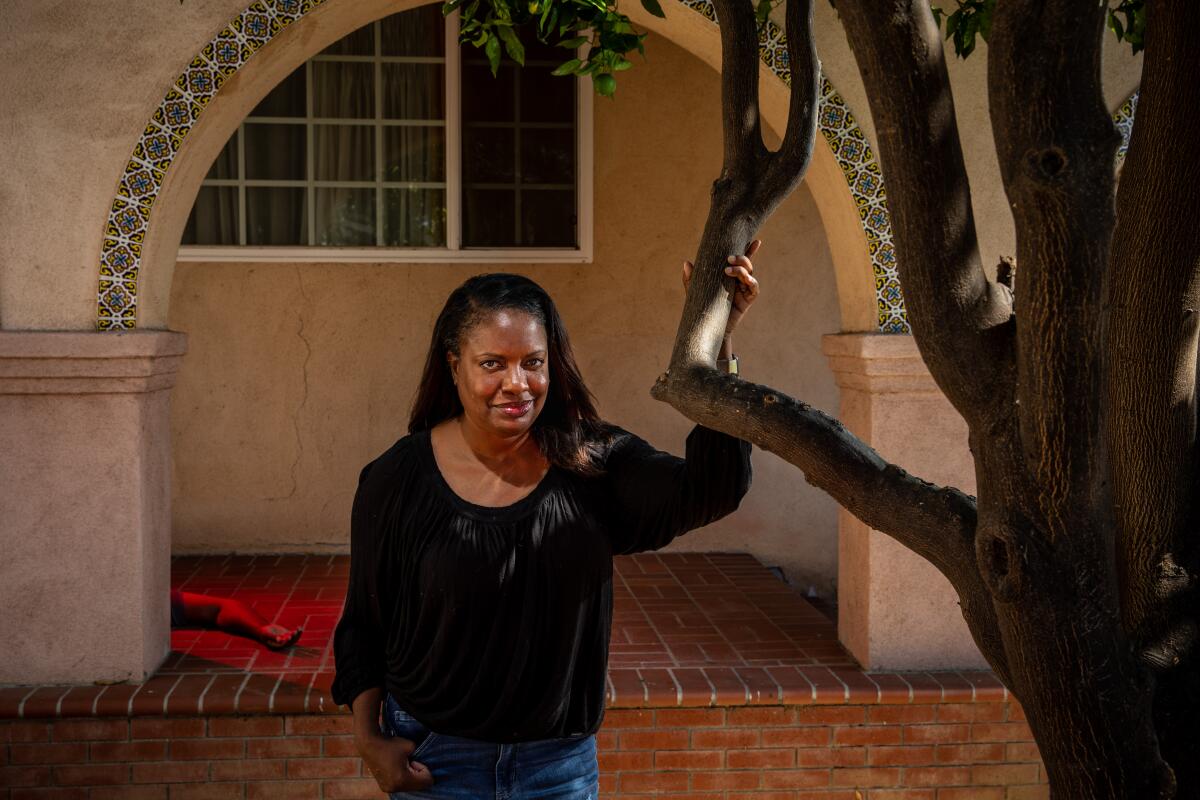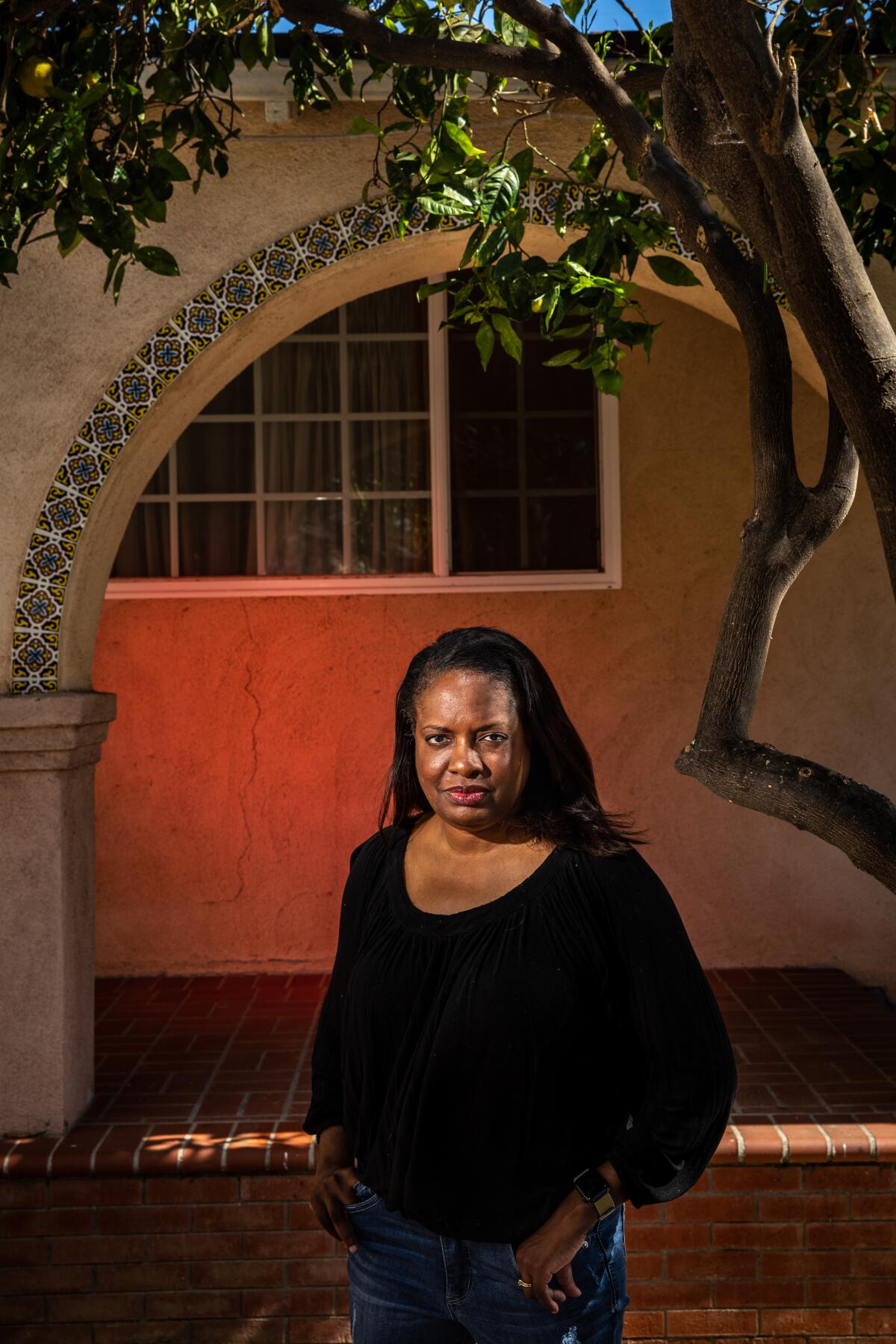A South L.A. crime novelist’s long road to writing one of best books of the year

- Share via
On the Shelf
And Now She's Gone
By Rachel Howzell Hall
Forge: 384 pages, $27.99
If you buy books linked on our site, The Times may earn a commission from Bookshop.org, whose fees support independent bookstores.
Whip-smart and emotionally deep, “And Now She’s Gone” is a deceptively straightforward mystery, blending a fledgling PI’s first “woman is missing” case with underlying stories about racial identity, domestic abuse and rank evil. Along the way, we get a myth-busting tour of South L.A. neighborhoods too frequently confined to alarming headlines and helicopter journalism.
It’s a lot — though it never feels that way. It’s also the culmination of a long personal and professional journey for L.A. native Rachel Howzell Hall. The author’s story began in the Jungle, an enclave of postwar apartments nicknamed for its lush foliage before white flight and absentee landlords led to its decline. Though working-class families like Hall’s were always the neighborhood’s foundation, raising one in what is now called Baldwin Village wasn’t easy for her mother, a preschool teacher, and her father, a warehouse supervisor. Hall’s parents were creative, aspirational and supportive of their four children. But the neighborhood was not: robberies, shootings and domestic violence were endemic, police helicopters a nightly companion. Rachel tried to make sense of what was happening around her by keeping meticulous journals and scouring the L.A. Times’ Metro section.
“I loved reading and recording every bad thing happening in Los Angeles, “ she remembers now with a rich, melodious laugh. “Sometimes I felt safer with that helicopter light in my window because that meant there would be some order after so much chaos around me.” School and church were safe havens, but to really escape, she says, she “cut her teeth” on genre fiction — Stephen King, Jackie Collins, Sidney Sheldon. So her parents weren’t surprised when their bookish daughter enrolled at UC Santa Cruz and announced she would major in English and American literature.
S.A. Cosby’s “Blacktop Wasteland” stakes out territory in undersung places — and sings too of the complex lives of Black men.
It wasn’t long before Hall started getting to know the world of writers and seeing where she might fit in. Her first professional job was with PEN Center USA, where she met local luminaries such as biographer Eric Lax, journalist Kit Rachlis and novelist Carolyn See. Even more important, she also rubbed elbows with local Black writers like Bebe Moore Campbell, Jervey Tervalon and Gary Phillips — people whose lives she could recognize in the community and on the page. “Of course I read Toni Morrison, Alice Walker and other classic Black writers in college,” she says. “But those stories were somehow, ‘over there,’ not immediately relevant to my experience. Seeing these regular Black people doing this thing called ‘writing’ gave me confidence that I could do it too.”
Her first novel, “A Quiet Storm,” was published in 2002 to reviews praising its crackling narration, “dark humor, wisdom and self-deprecation.” But its publication on the first anniversary of 9/11 didn’t help Hall gain traction. It wasn’t easy getting the next book deal — especially since Hall didn’t traffic in the kinds of urban Black stories, bordering on exploitation, that were trending with white publishers at the time. (Consider the since-discredited “memoir” by a white woman purporting to be a half-Native member of the Bloods gang.) Hall’s novels were about, for example, a well-to-do Black woman accused of murdering her ex-husband, or a reporter recovering from cancer surgery while tracking serial killers.
The rejections piled up; publishers just didn’t want to believe there was a market for her perspective on Black life. “It was extremely disheartening, as a Black writer, to be told, ‘Your voice isn’t Black enough’ or ‘your stories are too upmarket,’” she says today. Her agent dropped her, saying there was nothing she could do for her. “But the wonderful thing about writing is that it’s free. You just need a pad and a pen and the determination to push through.”
In a new kind of quarantine diary, a Black writer emerges from self-isolation to hit three protests in three days, one of them starring his daughter.
In the interim, she gave birth to her daughter, Maya, survived two cancer diagnoses, and kept writing. It would be more than a decade before her crime series — featuring down-to-earth, plugged-in Black LAPD detective Elouise ”Lou” Norton — clicked with a publisher. The second in the Norton series, “Skies of Ash,” was praised for paying “homage to that master of complex California homicide, Raymond Chandler,” and the fourth, “City of Saviors,” drew comparisons to Michael Connelly’s Harry Bosch series.
Even though the Norton procedurals have not garnered anything like the attention Bosch has enjoyed, Hall continues to find new ways of bringing her personal history and perspective into the literary crime tradition. Last year she published “They All Fall Down,” a riff on Agatha Christie’s “And Then There Were None” with a Black female protagonist. When I asked her why she chose that particular book to revise, she acknowledges the irresistible irony of reworking a novel whose original title in England was crudely racist. Then she tells a story from her days at UC Santa Cruz.
“In an English lit class, I suggested that the Dark Lady in one of Shakespeare’s sonnets could have been a Black woman,” she recalls. “My professor was adamant that it just wasn’t possible.” But having just read Othello, Hall wondered why another iconic Shakespeare figure couldn’t be Black. “One of the best parts of being a writer,” she says, “is being able to hold on to those little moments and use them in fiction.”
Her best novel yet, “And Now She’s Gone” operates on several levels. While newbie investigator Grayson Sykes’ relentless pursuit of a missing ex-girlfriend and the client’s dog is a classic PI setup, the novel also has one foot firmly planted in the domestic suspense genre, but with one important twist. Pushing into new terrain by addressing a topic that disproportionately affects Black women — domestic abuse — Hall has written complex character studies of both PI and victim that expose an issue not much discussed by the Black community or acknowledged by white people.

“Being a kid who read those Metro pages and watched the women around me, I soon realized there were many women in my community who were involved in abusive relationships — some physically abusive, others emotional, but they were all terrified in some way,” says Hall. “As a child, I would see these women come to church wearing heavy concealing makeup and it was obvious they were covering bruises. Or if their husbands spoke too loudly, the women would jump. At first I couldn’t understand. Then I refused to be reconciled to the notion that marriage meant being beaten.”
David Heska Wanbli Weiden talks about the motivations and the deeply embedded social and legal problems behind his potboiler “Winter Counts.”
While she acknowledges that some readers or critics may find the mashup jarring, Hall is comfortable with her novel’s unique recipe of genre ingredients in the service of a realistic story. “It fits very easily into domestic suspense, with a husband stalking his wife. It’s also a ‘cozy,’ with its inexperienced PI searching for a missing Labradoodle. But then readers will find a discussion of race and descriptions of physical violence — and the mechanics of a procedural.”
Regardless of how it’s categorized, “And Now She’s Gone” is earning Hall some of the best reviews of her career, aided perhaps by a heightened awareness of the need for stories that aren’t just nominally diverse but actually represent different facets of the Black experience. It’s a fittingly twisty novel with which to earn some laurels after a steep, often tortuous career climb — driven not just by Hall’s yearning to perfect a specific genre but by a mission to unearth stories you haven’t read before.
Woods is a book critic, editor of anthologies and author of the Detective Charlotte Justice procedurals.
More to Read
Sign up for our Book Club newsletter
Get the latest news, events and more from the Los Angeles Times Book Club, and help us get L.A. reading and talking.
You may occasionally receive promotional content from the Los Angeles Times.








